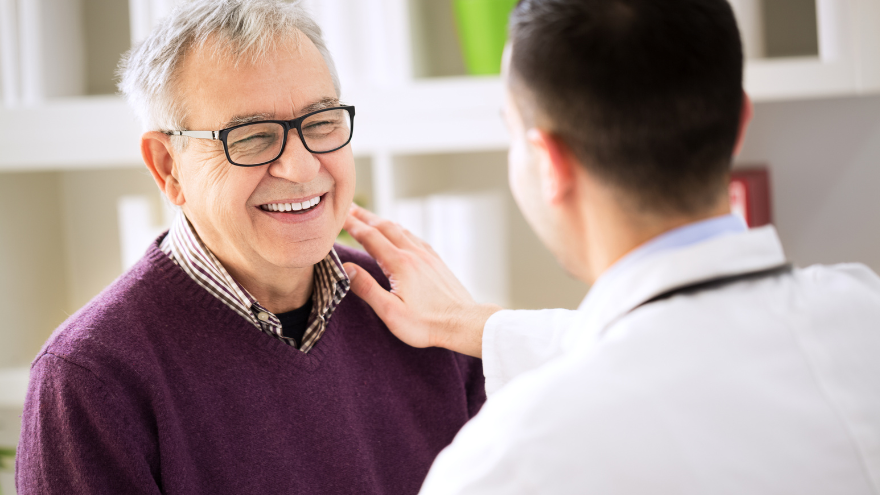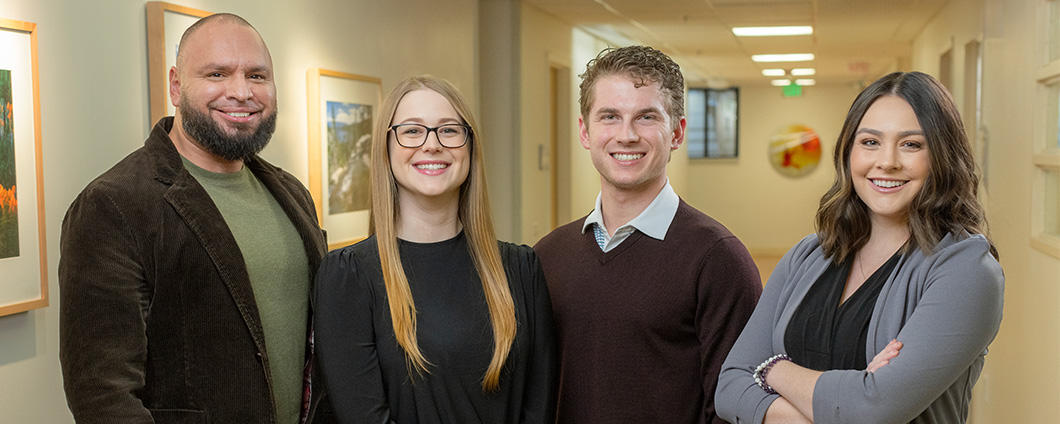Search
Results for 'doctor'
Clear-
Copays vs. Coinsurance: Know the Difference
Health insurance is complicated, but you don't have to figure it out alone. Understanding terms and definitions is important when comparing health insurance plans. When you know more about health insurance, it can be much easier to make the right choice for you and your family. A common question when it comes to health insurance is, "Who pays for what?" Health insurance plans are very diverse and depending on your plan, you can have different types of cost-sharing: the cost of a medical visit or procedure an insured person shares with their insurance company. Two common examples of cost-sharing are copayments and coinsurance. You've likely heard both terms, but what are they and how are they different? Copayments Copayments (or copays) are typically a fixed dollar amount the insured person pays for their visit or procedure. They are a standard part of many health insurance plans and are usually collected for services like doctor visits or prescription drugs. For example: You go to the doctor because you are feeling sick. Your insurance policy states that you have a $20 copay for doctor office visits. You pay your $20 copay at the time of service and see the doctor. Coinsurance This is typically a percentage of the total cost of a visit or procedure. Like copays, coinsurance is a standard form of cost-sharing found in many insurance plans. For example: After a fall, you require crutches while you heal. Your coinsurance for durable medical equipment, like crutches, is 20% of the total cost. The crutches cost $50, so your insurance company will pay $40, or 80%, of the total cost. You will be billed $10 for your 20% coinsurance.
-
Understanding Your Risks for Fatty Liver Disease
Did you know that about one in four adults and one out of every ten kids in the U.S. might have a liver problem called non-alcoholic fatty liver disease (NAFLD)? This happens when too much fat builds up in the liver, and it's not because of drinking alcohol. The most serious type of this liver problem is called metabolic and non-alcoholic steatohepatitis (M/NASH). It means there's damage and can be scarring in the liver. About 20% of people with fatty liver disease have M/NASH. What's worrying is that many people don't even know they have it. Dr. Catherine McCarthy, a family medicine doctor at the University of Nevada, Reno School of Medicine, talks about the main risks of M/NASH and how you can check your risk for liver disease during Liver Health Matters Month, or anytime. Who Might Get M/NASH? Doctors aren't sure exactly why some people get fatty liver or M/NASH. While anyone can get M/NASH, people who might be more at risk include those with: Type 2 diabetes Insulin resistance or prediabetes High body mass index (BMI) or obesity High cholesterol or other fats in the blood High blood pressure Signs of liver problems from tests or biopsies A family member living with M/NASH How Do Doctors Find Out If You Have M/NASH? Doctors can do different checks and tests to see if someone has fatty liver or M/NASH. They might look at your liver health through non-invasive tests such as blood work, ultrasounds or MRIs. They might also suggest a special blood test called an Enhanced Liver Fibrosis (ELF) test– offered at no-cost through the Healthy Nevada Project – to check your risks of advancing liver disease. How Can You Treat Fatty Liver Disease or M/NASH? Patients with moderate to advanced liver scarring may also be prescribed a recently approved therapy called Rezdiffra. However, prevention of advancing disease is still the best option. Actions you can take to improve your liver health and reduce your risk include: Eating healthy, especially low-carb foods Exercising regularly Losing weight if needed Not drinking alcohol Keeping an eye on blood sugar if you have diabetes No-Cost Liver Screening Through the Healthy Nevada Project If you live in Nevada and are 18 or older, you can qualify for a no-cost liver health screening by enrolling in the Healthy Nevada Project, one of the largest community-based population health studies in the entire country. This study helps doctors understand your liver health better and plan early treatments to stop liver disease from getting worse. By joining the Healthy Nevada Project, you can: Get the FDA-approved ELF test to check your risks for liver disease See your test results in your medical record to help your doctor plan your care better Help doctors and researchers learn more about M/NASH and work on future treatments Participate in genetic sequencing for high-risk conditions linked to heart disease and certain cancers, including breast and ovarian cancer Gain high-level health insights, including food sensitivities, and ancestry information. Enrolling in the study is easy: Schedule a Virtual Consent Appointment through MyChart where a study representative will answer any questions, confirm your eligibility and sign you up. Once you’re signed up, your representative will schedule your blood test. Go to your blood draw appointment. By taking part in this study, you're helping to make a difference in liver health research!
Read More About Understanding Your Risks for Fatty Liver Disease
-
Exceptional Talent Joins William N. Pennington Cancer Institute at Renown; Dr. Kate Ward Brings Expertise and Vision as Vice President of Oncology Division
Renown Health is pleased to announce that Kate A. Ward, Pharm.D., BCPS, has been promoted to serve as Vice President, Oncology for Renown Regional Medical Center. Dr. Ward has over fourteen years of service to the organization, most recently as Director of Clinical Pharmacy responsible for the oversight of all clinical pharmacy activities at Renown Regional Medical Center, Renown South Meadows Medical Center, and Renown Rehabilitation Hospital. Additionally, Dr. Ward is the Residency Director of the Post-Graduate Year 1 (PGY1) Pharmacy Practice Residency at Renown. Over the last decade at Renown, Dr. Ward has served as Pharmacy Clinical Manager, Pharmacy Clinical Coordinator and Clinical Pharmacist. Dr. Ward will bring her pharmacy clinical service experience (including ICU, Outpatient Infusion, Pediatrics, Oncology and Emergency Services), Inpatient Care, Clinical Research, and Hospital Formulary Management, Electronic Medical Record Integration and Optimization to this important new role. As a dyad partner with Max J. Coppes, MD, PhD, MBA, Director of the William N. Pennington Cancer Institute at Renown, she will bring her clinical, operational, regulatory, and administrative experience to lead the oncology division. Dr. Ward, Dr. Coppes and the dedicated team will advance Renown’s mission to expand care, prevention, screening, research, and education with the goal of establishing the first National Institutes of Health, NCI designated Cancer Center for our State. “We are thrilled to welcome Dr. Ward as our new Vice President of Oncology. She brings a wealth of experience and a passion for advancing patient care. Dr. Ward will play a pivotal role in sharing the future our oncology division and furthering our commitment to providing exceptional care,” said Chris Nicholas, CEO of Renown Regional Medical Center. As a licensed pharmacist, Dr. Ward holds a Doctor of Pharmacy degree from the University of Colorado, Health Sciences Center. The Pharm.D. is a professional degree like a Doctor of Medicine (MD) or Doctor of Dental Surgery (DDS). As a doctorate, it represents the increasing responsibility pharmacists have in healthcare systems and the high trust Americans have in pharmacists. Dr. Ward completed her residency at Stanford Hospital and Clinics. She graduated from the University of Nevada, Reno with her bachelor’s degree in Nutritional Sciences. Dr. Ward is active in several professional associations and currently serves as a Pharmacy Board member for HealthTrust; Vice Chair of the American Society of Health System Pharmacists® Council on Therapeutics; and Vice Chair for the Silver State Scripts Board for the State of Nevada. Dr. Ward was the 2022 recipient of the Nevada Society of Health System Pharmacists (NVSHP) President’s Award. About Renown Health Renown Health is the region’s largest, locally governed, not-for-profit integrated healthcare network serving Nevada, Lake Tahoe and northeast California. With a diverse workforce of more than 7,000 employees, Renown has fostered a longstanding culture of excellence, determination and innovation. The organization comprises a trauma center, two acute care hospitals, a children’s hospital, a rehabilitation hospital, a medical group and urgent care network, and the locally owned not-for-profit insurance company, Hometown Health. To join the Renown Health team, visit renown.org/careers.
-
Cancer Clinical Trials and Research
The William N. Pennington Cancer Institute is dedicated to find the causes of cancer and develop better treatments. We research a wide variety of areas. We perform traditional research in the laboratory and translational research with patients, and we look at how we provide counseling and support and clinical trials, in which patients have the option to try new therapies. We partner with research institutions, including local researchers at the University of Nevada Reno (UNR) and the Desert Research Institute (DRI), national and international researchers, non-profit organizations, and industry to help drive discoveries forward quickly. Cancer Clinical Trials & Research Participating in cancer clinical trials and research allows you to receive the most effective therapy available. These treatments investigate promising new drugs, drug combinations, advances in personalized care, and new approaches to surgery or radiation therapy otherwise unavailable. To join a clinical trial, talk to a member of your cancer care team. They will know about any current trials for your type of cancer, explain your role in the preparation, and provide information about your protection. Trial participants usually receive the therapy at little or no cost. If you are considering a trial, consult with your primary care doctor. At William N. Pennington Cancer Institute, we want to provide our patients with the opportunity to access novel treatments through participation in clinical trials. For adult patients, we offer clinical trials through the National Cancer Institute Community Oncology Research Program (NCORP). Dr. Garrett Green, Renown Health department of Radiation Oncology, serves as the Principal Investigator and Liaison for the adult oncology team. For specific information on which trials are currently available at our institution, please call us at 775-982-5050. For children, we offer clinical trials including phase 2 and phase 3 studies through the Children's Oncology Group. Dr. J. Martin Johnston, Chief of Pediatric Hematology/Oncology at Renown Children's Hospital and Senior Investigator, Renown Institute for Cancer, is the Principal Investigator. The Cancer Research Team As the most extensive healthcare system in northern Nevada and eastern California, and in partnership with clinical trial sponsors, the National Cancer Institute, and the Nevada Cancer Research Foundation, we can access dozens of open clinical trials. We are here to provide education and guidance in making decisions about your care and treatment. Our specially trained research teams will help you understand the process and explain what to expect with each visit. We are committed to bringing the highest quality of cancer care to you and your loved ones. To learn more about open clinical trials, please reach out to us with this form.
-
Renown's Dr. Kate Ward Honored with Nevada Society of Health System Pharmacists (NVSHP) President's Award
The award is given annually to a member of the Nevada pharmacy community making significant and sustained contributions to the field Kate Ward, Pharm.D., BCPS Director of Clinical Pharmacy at Renown Health is the 2022 recipient of the Nevada Society of Health System Pharmacists (NVSHP) President’s Award. Dr. Ward has been with Renown for over a decade, starting as a Clinical Pharmacist in 2009. As the Director of Clinical Pharmacy, she is responsible for the oversight of all clinical pharmacy activities at Renown Regional, South Meadows and Rehab. Additionally, Dr. Ward is the Residency Director of the Post-Graduate Year 1 (PGY1) Pharmacy Practice Residency at Renown Regional Medical Center. “We are so proud that Kate has been recognized by the Nevada Society of Health System Pharmacists with the President’s Award and for her many accomplishments as a member of our Renown Pharmacy team. With 66% of adults taking five or more drugs per day and 27% taking 10 or more per day, a pharmacist’s review is critical in supporting patient safety and well-being,” says Tom Graf, MD, interim CEO, Renown Health. “Beyond that, pharmacists have the ability to suggest methods for accurately and effectively taking prescribed medications, discuss medication safety, identify and manage side effects and assist patients and families in managing chronic health conditions.” As a licensed pharmacist, Dr. Ward holds The Doctor of Pharmacy degree (abbreviated Pharm.D. or PharmD) from the University of Colorado. The Pharm.D. is a professional degree similar to a Doctor of Medicine (MD) or Doctor of Dental Surgery (DDS). As a doctorate, it represents the increasing responsibility pharmacists have in healthcare systems and the high trust Americans have in pharmacists. The Doctor of Pharmacy degree takes three to four years of undergraduate pre-professional (prerequisite) coursework, followed by four academic years in a professional program. Most students need four years to complete their prerequisite courses. Thus, it usually takes eight years of college study to earn a Pharm.D. and become a pharmacist. Pharmacists working in hospitals and health systems often complete additional post-graduate training after a Pharm.D. degree. Dr. Ward completed a PGY1 Residency at Stanford prior to joining the Pharmacy Department at Renown. “Dr. Ward is such an asset to Renown and our community. Her incredible perseverance to reach for and achieve higher aspirations has resulted in this important recognition by our peers across the state. She consistently contributes her pharmacy expertise to patients, physicians, clinicians and healthcare students and volunteers her time to advance the profession at both the state and national level through pharmacy professional organization participation. It is wonderful to have her efforts recognized by NVSHP,” says Adam Porath, Pharm.D., BCACP, BCPS, FASHP, Vice President, Pharmacy. On Sept. 24, NVSHP and the Nevada Pharmacy Alliance held their annual joint meeting at Renown Regional Medical Center. During this meeting, Dr. Ward was awarded the NVSHP President’s Award. The President’s Award is awarded annually at NVSHP President's discretion to a member making significant and sustained contributions to NVSHP. Dr. Ward was specifically recognized for representing the State of Nevada at the American Society Health System Pharmacists House of Delegates for several consecutive years, as well as her continuous contributions to the annual NVSHP Student Symposium. Established in October 2006, NVSHP has diligently worked on continuing the strong foundation developed to better meet the needs of health-system pharmacists in Nevada. The organization was established on a strong mission statement that enables Nevada's pharmacists to be heard, from all regions of the state and in one collective voice to advocate for patient care. Are you interested in working with this award-winning team? The Renown Health Pharmacy is hiring for multiple roles, including pharmacy technician and clinical pharmacist. For more information, visit careers.renown.org. About Renown Health Renown Health is the region’s largest, locally governed, not-for-profit integrated healthcare network serving Nevada, Lake Tahoe and northeast California. With a diverse workforce of more than 6,500 employees, Renown has fostered a longstanding culture of excellence, determination and innovation. The organization comprises a trauma center, two acute care hospitals, a children’s hospital, a rehabilitation hospital, a medical group and urgent care network, and the region’s largest, locally owned not-for-profit insurance company, Hometown Health. Renown is currently enrolling participants in a community-based genetic population health study, the Healthy Nevada Project®.
-
8 Important Health Screenings for Men
Men are generally less likely to visit their doctor for exams, screenings, and consults compared to women. To address this, we've collaborated with Dr. Bonnie Ferrara of Renown Health, to compile a list of eight essential screenings that can help men maintain their health. 1. Blood Pressure Tests Ages 20+ Blood Pressure tests measure the pressure in your arteries as your heart pumps. Biennial (every two years) checks are recommended if you have normal blood pressure or more frequently if you have high blood pressure (hypertension) or low blood pressure (hypotension). The United States Preventative Services Taskforce cites normal blood pressure below 120 systolic (top number) and 80 diastolic (bottom number). 2. Cholesterol Screening Ages 20+ High levels of cholesterol increase your risk of stroke and heart disease. A simple blood test will help your healthcare provider determine your numbers and if you're at risk. If you have a family history of diabetes or heart disease, you may need yearly screenings. But, again, your doctor can provide the best course of action.
-
Powerlifting through MS Diagnosis
When Tabitha Cox received a diagnosis of multiple sclerosis (MS), she was in shock, denial and felt that she was too strong for something like this to be happening to her. As the disease progressed, Tabitha realized she needed to do what she could to stay as healthy as possible. “I heard, ‘You have a quarter-size lesion on your brain,'” recalls Tabitha Cox. “At that moment, that was literally all I heard come out of her mouth.” Tabitha’s official diagnosis was multiple sclerosis (MS), an unpredictable, often disabling disease of the central nervous system that slowly debilitated her mom. “I was numb,” says Tabitha. After her diagnosis, Tabitha went on with her life as if the disease was nothing more than a doctor’s diagnosis. However two years later, Tabitha realized something wasn’t right and sought care at Renown Institute for Neurosciences – Brain and Nerve Care. Her form of MS was aggressive, and her doctor recommended treatment right away.




